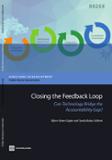Resource information
Enhanced transparency, accountability, and government or donor responsiveness to people needs are imperative to achieve better and more sustainable development results on the ground. The rapid spread of new technologies is transforming the daily lives of millions of poor people around the world and has the potential to be a real game changer for development. Improved accountability and responsiveness are critical for reaching the goals of eliminating extreme poverty and promoting shared prosperity with a focus on improving the well-being of the most vulnerable and marginalized groups in society.
Within the broader political economy context, many questions remain unanswered about the role that new technologies can play to act as an accelerator for closing the accountability gap. Within this context, this report brings together new evidence from leading academics and practitioners on the effects of technology-enabled citizen engagement. The report aims to address the following four main questions: how do new technologies empower communities through participation, transparency, and accountability?; are technologies an accelerator for closing the accountability gap - the space between supply (governments, service providers) and demand (citizens, communities,civil society organizations) that must be bridged for open and collaborative governance?; under what conditions does this occur?; and what are the experiences and lessons learned from existing grassroots innovators and donor-supported citizen engagement and crowdsourcing programs, and how can these programs be replicated or scaled up?.
The report presents a theoretical framework about the linkages between new technologies, participation, empowerment, and the improvement of poor people's human well-being based on Amartya Sen's capability approach. The book provides rich case studies about the different factors that influence whether or not information and communication technology (ICT)-enabled citizen engagement programs can improve the delivery and quality of public services to poor communities. The report analyzes in depth both the factors and process of using new technologies to enhance the delivery of primary health services to pregnant women in Karnataka, India, and of several community mapping and crowdsourcing programs in Guinea, Haiti, Kenya, Libya, Sudan, and other countries.


